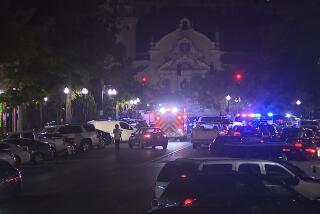Police Seek Public’s Help in Bali Probe
- Share via
KUTA, Indonesia — Police on Bali appealed to the public Monday for assistance in identifying three suspected suicide bombers whose dismembered remains were found at the scene of the restaurants they attacked.
Acknowledging that authorities had no new leads, Bali police spokesman Soenarko said they had set up a hotline to receive tips and that they would distribute photos of the dead suspects widely.
“Our first target is to identify these three people,” said Soenarko, who like many Indonesians goes by one name. “We hope people who recognize them will give us information.”
Hospital officials helping to identify victims of the Saturday night restaurant bombings scaled back the death toll to 22, including the three suspected bombers. Fourteen of the victims were Indonesian, one was Australian and one was Japanese. Three bodies remain unidentified, and authorities believe they are all foreigners.
Health officials say they may never know how many people were killed at each of the restaurants because no one recorded where the victims came from when they arrived at hospitals.
The restaurant bombings were the second major terrorist attack to hit Bali, which has a predominantly Hindu population. Suicide bombings of two nightclubs killed 202 people, most of them foreigners, three years ago this month.
Authorities suspect that members of Jemaah Islamiah, an extremist Muslim group that carried out the first attack, are responsible for Saturday’s bombings.
Hundreds of mourners attended a Balinese Hindu cremation ceremony Monday for Gusti Ketut Sudana, 33, a waiter who was killed by the explosion at Raja’s restaurant in Kuta.
The mourners, wearing traditional sarongs and headgear, gathered at Sudana’s home, where they made offerings and prayed to the sound of pounding drums and clanging cymbals. Then they marched from his home to the cremation site, blocking traffic on the heavily traveled road to the airport as dozens of men carried the coffin on bamboo poles.
Sudana’s father, Gusti Ketut Lalis, 70, rejected the idea that the bombers were acting in the name of religion.
“They are animals,” he said. “If people have religion they don’t do this.”
Throughout the day, hundreds of people gathered near the bomb sites in Kuta and Jimbaran, which were cordoned off by yellow police tape.
At the beach in Jimbaran, where two open-air cafes were attacked, investigators placed a pole in the sand to mark the spot where one of the bombs went off, and ran pieces of string to indicate the path of the blast. Broken chairs lay in the sand, apparently just as the bomb left them.
On the opposite side of the restaurants shortly before sunset, 500 people held a Balinese Hindu cleansing ceremony that will be repeated intermittently over the next six weeks. Sitting cross-legged and raising their hands above their heads, they prayed for the removal of evil and bad luck from their lives.
“The ceremony is intended to cleanse all the sorrow that covers the area,” said Ida Bagus Made Lodra, 52, a part-time university lecturer who participated in the ritual. “By doing this, hopefully gradually the feelings can come back to normal.”
Indonesia has more Muslims than any other country and Hindus make up a small minority of the population. But Lodra rejected the idea that Bali had been the target of two terrorist attacks because of its predominant religion.
“We don’t want to relate this to any religion,” he said. “This is the work of terrorists.”
More to Read
Sign up for Essential California
The most important California stories and recommendations in your inbox every morning.
You may occasionally receive promotional content from the Los Angeles Times.










